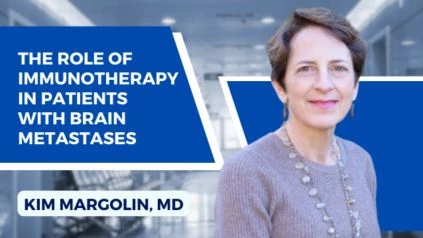By. Kim Margolin, MD
Date. 11/17/2023
In the field of cancer immunotherapy, Kim Margolin, MD, provides insights into the interplay between the innate and adaptive immune systems. According to her, the innate immune system serves as a bridge, reacting swiftly against pathogens. This orchestration involves the secretion of cytokines, cytotoxic granules, and the engulfing of pathogens. Margolin emphasizes the concert between innate and adaptive immune responses, highlighting the significance of acute inflammation in anticancer reactions, in contrast to immunosuppression associated with chronic inflammation.
Margolin delves into the field of tertiary lymphoid structures within tumors, elucidating their composition, which mirrors that of the adaptive immune system. She emphasizes the dynamic nature of tumor stroma, dispelling the notion of static, structural elements. The stromal cells, including cancer-associated fibroblasts and various dendritic cell types, contribute functionally, playing crucial roles in immune reactions against pathogens and cancer.
Turning her attention to the microbiota, Margolin discusses its role in cancer immunotherapy. Focusing primarily on the gut microbiome, she elaborates on studies revealing certain bacteria associated with responses to immunotherapy. She discusses therapeutic interventions involving the transfer of fecal microbiome from immunotherapy-responsive animals to enhance outcomes in mice. Margolin suggests that understanding the nucleic acids of bacteria could pave the way for future therapeutic advancements.
Margolin then explores the landscape of cancer immunotherapy, investigating antigens and delivery approaches. Neoantigens, generated by mutations in cancer cells’ DNA, stand out as targets. Sequencing these neoantigens allows for the creation of vaccines that stimulate adaptive immune responses. She highlights the diversity of vaccine approaches, ranging from killed cells to recombinant DNA-based substances, each undergoing rigorous study for efficacy against different cancer types.
The discussion concludes with a focus on the flip side of immunotherapy success—immune-related toxicities. Margolin acknowledges the breakthroughs in immune checkpoint blockade therapy but underscores the challenge of breaking tolerance, leading to potential autoimmune-like reactions. She discusses the use of immunosuppressive drugs to manage these adverse effects, noting that patients typically retain control over cancer, even after necessary interventions to counter immune-related toxicities. While the field is not without its challenges, Margolin expresses optimism about the ongoing progress in balancing the therapeutic benefits and potential side effects of cancer immunotherapy.

